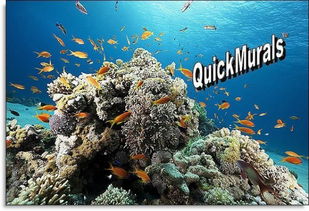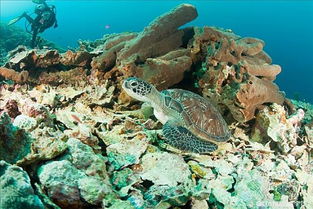Coral Reef Facts: A Diverse and Vital Ecosystem
Coral reefs are among the most diverse and vibrant ecosystems on Earth, teeming with life and playing a crucial role in the health of our planet. As you delve into the fascinating world of coral reefs, you’ll discover a myriad of facts that highlight their importance, beauty, and the challenges they face.
What Are Coral Reefs?

Coral reefs are formed by the accumulation of calcium carbonate skeletons secreted by tiny marine organisms called coral polyps. These polyps live in colonies, and as they grow and reproduce, their calcium carbonate skeletons build up to create the intricate structures we see today. Coral reefs are found in warm, shallow waters, primarily in tropical and subtropical regions.
Biological Diversity

Coral reefs are home to an incredible array of marine life, including fish, mollusks, crustaceans, and countless other species. In fact, coral reefs are often referred to as the “rainforests of the sea” due to their high biodiversity. Here are some fascinating facts about the biological diversity of coral reefs:
| Species | Number of Species |
|---|---|
| Fish | Over 4,000 species |
| Sharks and Rays | Over 500 species |
| Marine Invertebrates | Over 10,000 species |
| Algae and Plants | Over 1,000 species |
These numbers only scratch the surface of the incredible diversity found within coral reefs. The complex interactions between species contribute to the stability and resilience of these ecosystems.
Importance of Coral Reefs

Coral reefs play a vital role in the health of our planet, providing numerous benefits to both marine and human life. Here are some of the key reasons why coral reefs are so important:
-
Climate Regulation: Coral reefs absorb carbon dioxide from the atmosphere, helping to mitigate climate change.
-
Shelter and Breeding Grounds: Coral reefs provide shelter and breeding grounds for countless marine species, including fish, crustaceans, and mollusks.
-
Food Source: Coral reefs support a wide range of fish species, which are a vital food source for many coastal communities.
-
Economic Benefits: Coral reefs contribute to the economies of many coastal nations through tourism, fishing, and other industries.
-
Medicinal Resources: Many marine organisms found in coral reefs have medicinal properties, and ongoing research could lead to new treatments for various diseases.
Threats to Coral Reefs
Despite their importance, coral reefs face numerous threats that put their survival at risk. Some of the most significant threats include:
-
Climate Change: Rising sea temperatures and ocean acidification are causing coral bleaching, which can lead to the death of coral reefs.
-
Overfishing: Overfishing can deplete fish populations, disrupt the food chain, and damage coral reefs.
-
Coastal Development: Coastal development, such as construction and pollution, can harm coral reefs and the marine life they support.
-
Invasive Species: Invasive species can outcompete native species and disrupt the balance of coral reef ecosystems.
Conservation Efforts
Recognizing the importance of coral reefs, many organizations and governments are working to protect and conserve these vital ecosystems. Some of the conservation efforts include:
-
Marine Protected Areas: Establishing marine protected areas helps to safeguard coral reefs and the species that depend on them.
-
Reef Restoration: Restoring damaged coral reefs through techniques such as coral gardening and artificial reef construction.
-
Community-Based Management: Involving local communities in the management and conservation of coral reefs.
-
Education and Awareness: Raising awareness about the importance of coral